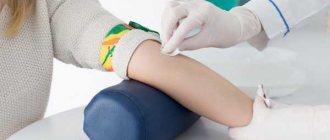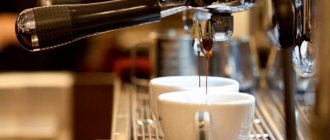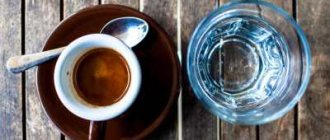Ultrasound examination is one of the most common methods for diagnosing the condition of the body. The point is that special waves detect the condition of tissues and transmit data, showing a clear picture. An ultrasound of the abdominal cavity determines the condition of blood vessels, the presence of gases, the amount of gastric juice and other characteristics, so it is necessary to cleanse the organs of toxins as much as possible in order to assess the condition of the tissues. Before the examination, a special diet is usually prescribed. When asked whether it is possible to drink coffee before an abdominal ultrasound, most doctors answer in the negative, but you need to understand that everything is quite ambiguous.
How to eat properly?
Is it possible to eat before an ultrasound? Ultrasound examination is performed on an empty stomach. Therefore, you cannot eat for 8-10 hours and drink for 2-3 hours. For children, the duration of fasting is reduced. Infants are not allowed to eat for 3 hours, 1-3 year olds for 4 hours, and children aged 3-12 years for 6-8 hours. It is not recommended for children to drink water within an hour.
People diagnosed with diabetes should not fast for long periods of time. Therefore, before the session, they can drink tea and eat a piece of dried white bread. You need to eat little by little, but often (every 3-4 hours). You can't wash down your food. Drinking is allowed only 40 minutes after a meal or an hour before it. While eating, you should not rush or talk to prevent swallowing air.
During the day, you should drink about one and a half liters of liquid: purified or mineral still water, unsweetened lightly brewed tea, herbal teas, unsweetened compote, liquid jelly.
Dinner on the eve of diagnosis should be light; meat and fish dishes should not be consumed. You cannot have breakfast on the day of the diagnosis. If the examination is scheduled for the afternoon, then a light breakfast is allowed, but a couple of hours before going to the clinic you need to take enterosorbents.
Prohibited and permitted products
The diet before an abdominal ultrasound is aimed at high-quality visualization, obtaining the most accurate results and preventing distortions. Therefore, for 3-4 days before the examination, you need to pay special attention to nutrition. It is necessary to consume foods that minimize irritation of the mucous membranes and gas formation, and prevent contraction of smooth muscles.
Foods that increase gas formation should be excluded from the diet:
- black bread;
- baked goods;
- fatty meat and fish;
- chocolate and candies;
- vegetables and fruits;
- legumes;
- sausages;
- smoked meats;
- fried foods;
- pickles and marinades;
- herbs and spices;
- mushrooms;
- dairy products;
- coffee and strong tea;
- juices;
- carbonated and alcoholic drinks.
You are allowed to eat porridge from various cereals, boiled in water, lean meat, lean fish, boiled eggs, hard cheese, and white bread. Food needs to be steamed, boiled or baked.
Many people are accustomed to drinking coffee in the morning. But before diagnosis you will have to refrain from this habit. The drink changes the functionality of internal organs, increases vascular tone, relaxes the muscles of the bile duct, and stimulates the activity of the gallbladder.
You can drink tea, but it should be unsweetened and weak. It is recommended to give preference to green tea or a drink made with herbs. But you should not drink it on the day of diagnosis, as it also contains caffeine.
During preparation for an abdominal ultrasound, you can adhere to the following menu:
- Breakfast - one boiled egg, green tea.
- Lunch - a piece of low-fat hard cheese.
- Lunch - boiled or steamed dietary meat, compote.
- Afternoon snack - porridge.
- Dinner - boiled or baked low-fat fish, still mineral water.
Following a diet before diagnosis will not only ensure high accuracy of the result, but will also benefit the body - it will have a healing effect, allow you to lose several kilograms, and reduce the load on the internal organs.
The effect of coffee on blood composition
According to superficial judgments, coffee cannot affect the number of red blood cells, platelets, leukocytes and bilirubin content, etc. It's not just caffeine that affects the body. Natural grains contain more than two thousand elements, many of which have not yet been studied by scientists. Therefore, before taking tests, refuse the drink.
When establishing the causes of the disease, consult with specialists about your favorite drink. After all, caffeine has a complex effect on a person. It affects the functioning of glands, organs, blood vessels, and somewhat changes the overall picture of blood composition.
Find out if you can drink coffee before donating blood:
- A doctor, when sending a patient to the laboratory, does not always warn that drinking coffee before taking tests is undesirable. Patients take advantage of this by drinking a flavored drink. It’s good that when the direction is drawn up for general analysis, a cup of Americano will not spoil the result. Just do not drink the drink with milk, sugar, condensed milk and other additives.
- In a detailed analysis, espresso cannot be drunk without milk and other components. It will be impossible to establish a complete picture of the disease. You will have to retake laboratory tests. You will only waste your time. They may also make an incorrect diagnosis and treatment of the disease will be ineffective.
- To test blood for hormonal imbalance, the presence of caffeine will negatively affect the entire test. It affects the functioning of the glands and adrenal glands. Therefore, you will have to live one morning without coffee at all. You are allowed to drink only water without gas. You can't even have tea.
- If you are having a blood test from a vein, caffeine is contraindicated. The only thing that the drink will not affect is the analysis to determine the Rh factor and blood type.
- Testing for uric acid is carried out on an empty stomach; only water is allowed during the test. A drink made from coffee beans can change the reliability of the tests. It stimulates the functions of the urinary system. Works as a diuretic.
- The influence of coffee constituents on infection tests has not been fully studied. Doctors do not recommend drinking the drink before the procedure. If you suddenly have a false positive test for a particular infection after drinking espresso, then retake the test to be sure.
People drink decaffeinated coffee before tests to satisfy their decaffeination needs. The drink is equivalent to regular coffee. Give it up. Moreover, do not drink instant drinks. It will definitely ruin the test results, and you will have to do everything all over again.
A cup of strong tea also contains caffeine. Do not drink the drink before tests.
Some important nuances
12 hours before the diagnosis, you should cleanse the intestines by doing an enema - using an Esmarch mug, 1.5 liters of cool water are injected into the rectum. An alternative to an enema can be microenemas or laxatives.
If necessary, your doctor may prescribe medications to improve digestion and prevent flatulence. It is advisable to avoid other medications, especially antispasmodics. If this cannot be done, then you must inform your doctor.
You must refrain from smoking for two hours before diagnosis, as nicotine provokes spasms of the gallbladder and stomach. In addition, smoking promotes air absorption.
Before going to the clinic, you should not use refreshing lollipops or chewing gum.
If an examination of the genitourinary system is planned, an hour and a half before the procedure you need to drink a liter of gas-free water and not urinate.
If the patient has undergone colonoscopy, fibrogastroduodenoscopy, or radiography with contrast, then an ultrasound examination can be done only after two days.
What to do after an ultrasound
After the procedure, the diagnostician gives the patient a protocol that describes each organ and notes all changes. Based on the information received, the doctor who issued the referral makes a diagnosis and prescribes treatment. If necessary, he may prescribe additional diagnostics. If there are no pathologies, then the protocol indicates that there are no peculiarities on the organs located in the abdominal cavity.
After the ultrasound, you can return to your usual lifestyle and normal diet. Dietary restrictions will be necessary only if the doctor prescribes a special diet based on the diagnostic results.
Our clinic offers the following types of ultrasound
- Abdominal ultrasound
- Ultrasound of the pelvic organs
- Ultrasound of the mammary glands
- Kidney ultrasound
- Ultrasound of the thyroid gland
- Ultrasound of neck vessels
- gynecological ultrasound
and others.
Features of the procedures
You will have to prepare for the examination in advance - proper nutrition and drinking regime affect the quality of the final data. Many patients are concerned about the question: “Is it possible to eat before an abdominal ultrasound?” In order to give a full answer to this, let's look at what can distort the image.
To obtain a reliable diagnostic picture of the examination, it is very important to exclude the following factors:
- muscle spasms of organs;
- food residues in the gastrointestinal tract;
- motor activity of smooth muscles;
- a large amount of gases in the intestines;
- a significant layer of hypodermis (subcutaneous fatty tissue), which is caused by excess body weight;
- filling the digestive organs with a contrast agent after fluoroscopy.
To conduct an ultrasound of the abdominal organs, the patient takes a horizontal position on his back; the doctor may ask him to take a deep breath or exhale, and take a comfortable position on his left/right side.
During the session, the patient sits comfortably on a couch, usually lying on his back. The sonologist may ask him to take deep breaths and exhale, turn on his side, and perform other actions to help him better see the organ being studied.
Preparation for ultrasound scanning is to minimize the influence of factors that can distort the results:
- muscle spasms of internal organs;
- motor activity of smooth muscles;
- food debris in the stomach cavity and other parts of the gastrointestinal tract (gastrointestinal tract);
- accumulation of gases in the intestines;
- a thickened layer of subcutaneous fat observed in overweight patients;
- remnants of a coloring substance after contrasting forms of radiography, computed tomography and others.
The main reason that distorts the results of ultrasonographic examination is the accumulation of gases and food debris in the intestines. To reduce the impact of these factors, it is important to adhere to a dietary regimen. If necessary, for example, with chronic constipation, it is recommended to take enterosorbents and enzymatic preparations. In order for the diagnostic results to demonstrate objective data, it is important to adhere to the established rules.
Is it possible to eat immediately before an ultrasound? This depends on the survey area. The default is yes. It is forbidden to eat or drink only before an abdominal ultrasound. A special diet before an ultrasound of the gastrointestinal tract and pelvis is another important stage of preparation. This diet involves a limited diet, excluding any fatty and other foods that contribute to increased gas formation. You should start following it 3-5 days before the date of the procedure. We will talk further about what and how to eat correctly.
General rules
In most cases, ultrasound scanning is performed without additional preparation. An exception is the examination of organs located in the abdominal cavity: liver, gall bladder, pancreas and others. In order for the diagnostician to better visualize them, the patient must strictly adhere to the prescribed recommendations. They are aimed at seeing a clear image of the organs on the monitor, not distorted by interference. The general rules are:
- adhere to the prescribed diet;
- consult a specialist about prescribing medications;
- If you have bad habits, inform your doctor about it.
Two days before the examination, it is recommended to start drinking enzyme preparations - Mezim, Creon, pancreatin-containing, Festal. They are needed for better digestion of food. They should be taken three times a day with meals. It is also advisable to take simethicones (carminatives) for three days, for example, Espumisan three times a day before meals in a dosage suitable for the patient.
An enema is given to cleanse the intestines. This is done in the evening before the study no later than 18:00. Using an Esmarch mug and a rubber tube, one and a half liters of cool water are injected into the rectum. After these procedures, sorbents are taken. Alternative options to enema are cleansing with Microlax microenemas, taking laxatives (for example, Fortrans). People over 14 years of age should drink it like this: one sachet per 20 kg of body weight.
We should also talk about preparing for a routine ultrasound during pregnancy. In the normal course of the process and the woman’s stable condition, ultrasound screening is performed three times - once in each trimester. In rare cases, an unscheduled examination is performed immediately before childbirth (to make a decision on the method of delivery), if a serious pathology of the fetus or maternal disease is suspected.
DETAILS: Is it possible to eat before donating blood: what you can’t eat and what you can, diet before donating blood
The first pregnancy ultrasound is scheduled at 7…12 weeks. Its purpose is to confirm the fact of conception, a general assessment of the patient’s condition and a test for the presence of genetic abnormalities. At this stage, the condition of the fetus and the woman’s multiple pregnancy are determined. The regulated time for the second screening diagnosis falls on the 20th...23rd week, the third - from the 32nd to 34th week.
At these stages, possible abnormalities in the development of the fetus are checked, as well as the functionality of the blood flow between the mother’s body, the fetus and the placenta. Preparation for scanning includes the same requirements as for ultrasound of internal organs. Eating on the day of the procedure is allowed unless a biochemical blood test is prescribed. Eating is prohibited on the eve of biomaterial collection.
Ultrasound technology allows you to examine almost all areas of the human body. Based on the medical history, the results of the initial examination and clinical tests, the observing doctor may prescribe a scan of a particular area. So, indications for ultrasound of the abdominal cavity are:
- suspicion of appendicitis;
- sharp pain in the abdomen, especially under the right rib. Bitter taste in the mouth;
- abdominal aortic aneurysm;
- kidney stones and cholelithiasis.
An ultrasound of the heart is necessary if abnormalities are detected on the ECG (electrocardiogram), suspicious murmurs, instability of blood pressure, ischemic heart disease (coronary heart disease), cardiomyopathy, and so on. Ultrasound of the kidneys is indicated for complaints of symptomatic pain in the lower back, urolithiasis, and dysuric phenomena. The thyroid gland should be checked if symptoms such as rapid heartbeat, sweating, chilliness, fatigue and others are observed.
Using ultrasound, you can carefully study the anatomical features of the organs in question, which will allow you to create a more detailed diagnostic picture. By the way, the procedure is considered safe and completely painless.
Check out the list of some details that can be identified during the process:
- shape and size of organs;
- the texture of the tissues lining the interior of the structures in question;
- any neoplasms and areas of hemorrhage;
- kidney stones (stones) and other foreign inclusions;
- visualization of large vessels feeding organs, etc.
It is worth noting that the study will be significantly more difficult if there are foci of gas formation and fermentation in the stomach and intestinal system caused by the consumption of a certain list of products. Therefore, it is necessary to pay close attention to your diet, prescribed by your treating specialist, usually 3 days before the ultrasound. So what should you do when following a diet?
Details of dietary nutrition should be discussed with your doctor.
Is it possible to eat before an abdominal ultrasound? You should not drink before the procedure. If the abdominal examination is scheduled for the afternoon, you can have breakfast. Meals should include only permitted foods. You should finish eating any food before 11 am if the ultrasound is scheduled for 3 pm.











